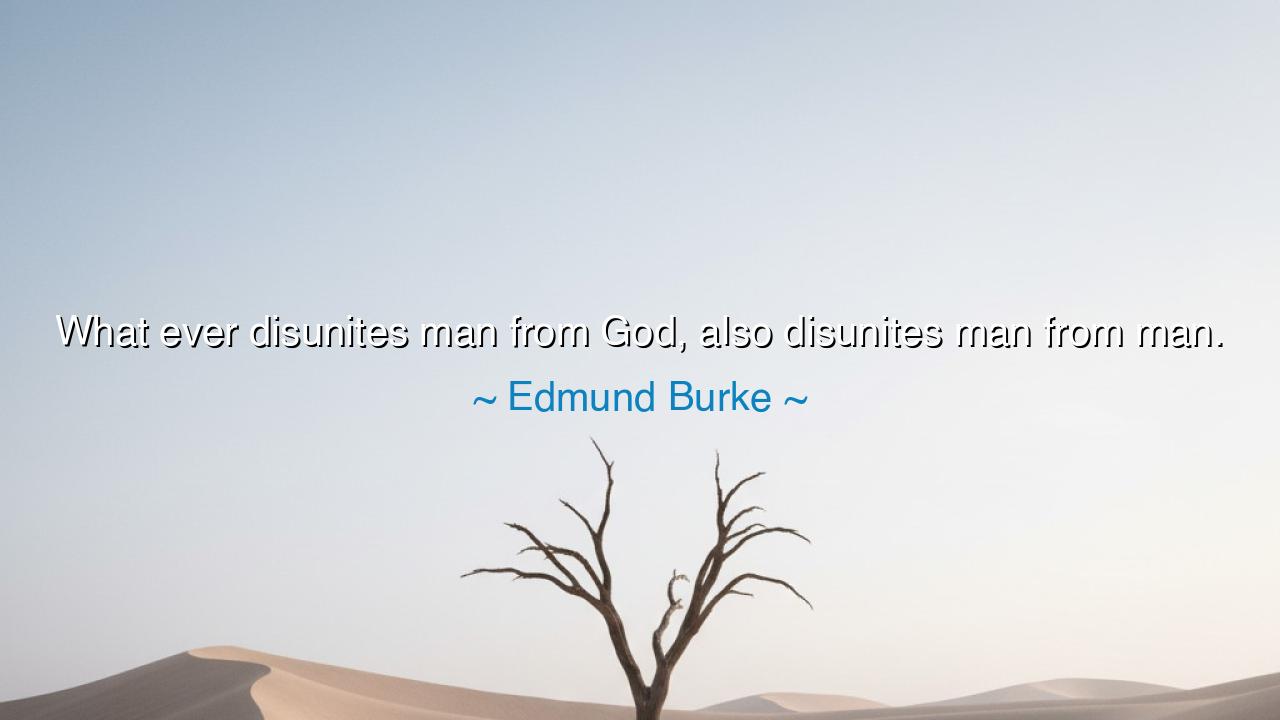
What ever disunites man from God, also disunites man from man.






The words “Whatever disunites man from God, also disunites man from man” were spoken by Edmund Burke, the great Irish statesman and philosopher of the eighteenth century — a man who, though immersed in the storms of politics and revolution, never ceased to see moral law as the true foundation of civilization. In this single sentence, Burke distills an eternal truth: that the bond between humanity and the Divine is also the bond that holds humankind together. To separate oneself from God, the source of truth, justice, and love, is to sever the invisible threads that unite soul to soul and heart to heart. For the order of heaven and the harmony of earth are one and the same current flowing through different vessels.
In Burke’s age, the world trembled on the brink of transformation. The French Revolution, which began as a cry for liberty, descended into chaos and bloodshed. Burke, though a lover of freedom, warned that in rejecting divine moral order — in casting aside faith, humility, and reverence — men would destroy not only their relationship with God but also their fellowship with one another. When man dethrones God in his heart, he soon dethrones compassion, duty, and honor. Thus, Burke’s words were not mere philosophy; they were prophecy. The guillotine rose where altars fell, and the cry for equality drowned in rivers of blood. He saw clearly that the disunion from the Divine leads to the disunion of humanity.
The meaning of Burke’s saying reaches far beyond politics — it speaks to the very condition of the soul. God is not only the Creator but also the unifying center of all existence, the light in which truth and love become possible. When we lose that center — when pride replaces reverence, or when selfishness replaces compassion — we drift apart like stars torn from their orbit. The same ego that exalts itself above God will soon exalt itself above its fellow men. The fall from divine communion always leads to the breakdown of human community. Thus, every act of hatred, injustice, or cruelty is not only a moral failure but a spiritual disconnection.
History offers many mirrors of this truth. Consider Fyodor Dostoevsky’s Russia, where faith was mocked as superstition by a new generation of intellectuals who believed reason alone could govern the soul. In The Brothers Karamazov, Dostoevsky gives voice to Burke’s insight through the character Ivan, who declares that if there is no God, then “everything is permitted.” This denial of divine order leads inevitably to moral chaos — a world without responsibility, compassion, or conscience. In rejecting God, man loses the moral compass that binds him to his brother. And so, in both Burke’s politics and Dostoevsky’s literature, we see the same truth unveiled: when God is forgotten, man forgets himself.
But Burke’s wisdom is not a call to fear or despair — it is a call to restoration. It reminds us that to rebuild unity among people, we must first restore our unity with the Divine. When a person seeks God — not in ritual alone but in sincerity of heart — they rediscover the law of love that governs all human connection. Forgiveness becomes possible, mercy blossoms, and justice takes root. The heart that bends toward Heaven can no longer harden itself toward earth. Thus, every act of prayer, every moment of humility, every gesture of compassion rekindles the golden chain that binds humanity together.
In this light, the quote speaks also to the inner life of individuals. Within each of us lies both the divine spark and the shadow of separation. When anger, greed, or pride pulls us from the awareness of God’s presence, we become estranged not only from the Divine but also from the people around us. Families fracture, nations divide, friendships wither. But when we return to God — through truth, forgiveness, and gratitude — the walls begin to crumble, and communion is restored. The healing of the world begins in the healing of the soul.
The lesson is as clear as it is timeless: peace among men depends on peace with God. Love for humanity cannot thrive where reverence for the divine has died. To unite mankind, we must first anchor our hearts in the eternal source of unity itself.
Practical actions: Begin each day by aligning your heart with the Divine through prayer, meditation, or silent gratitude. When conflict arises, ask not first, “Who is right?” but “Am I still walking with God?” Practice forgiveness, for it is the reflection of divine mercy. Seek truth, for it is the bond between heaven and earth. And remember Burke’s wisdom — that every separation from God is a step toward division among men, but every return to God is the beginning of reconciliation, peace, and love.






AAdministratorAdministrator
Welcome, honored guests. Please leave a comment, we will respond soon